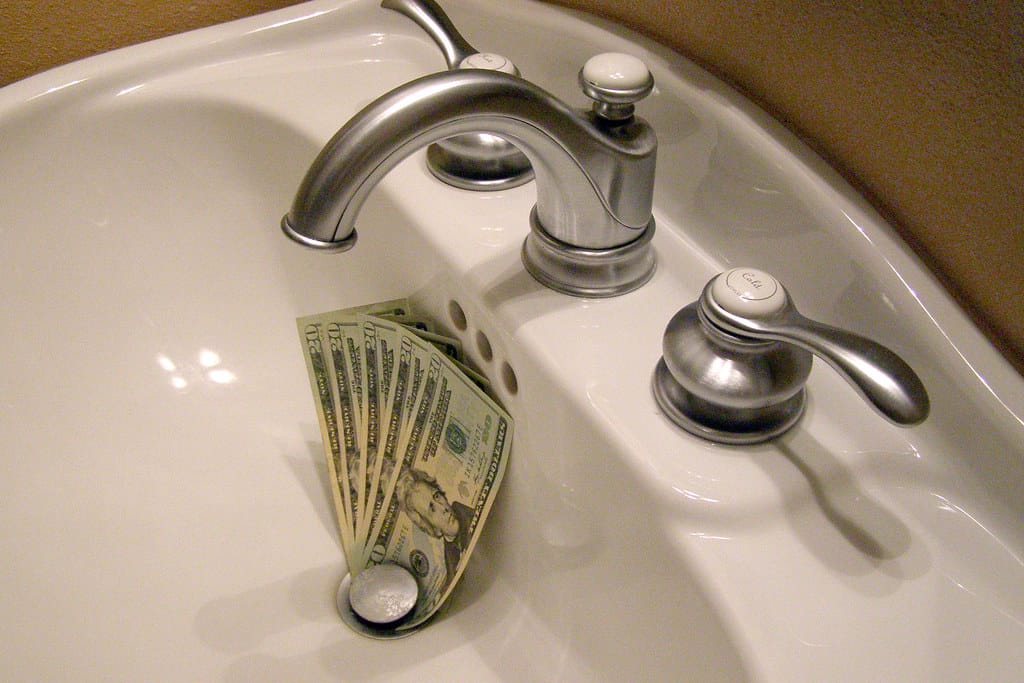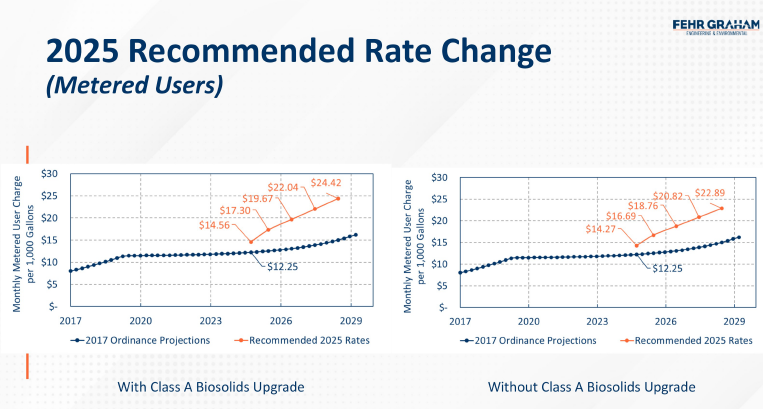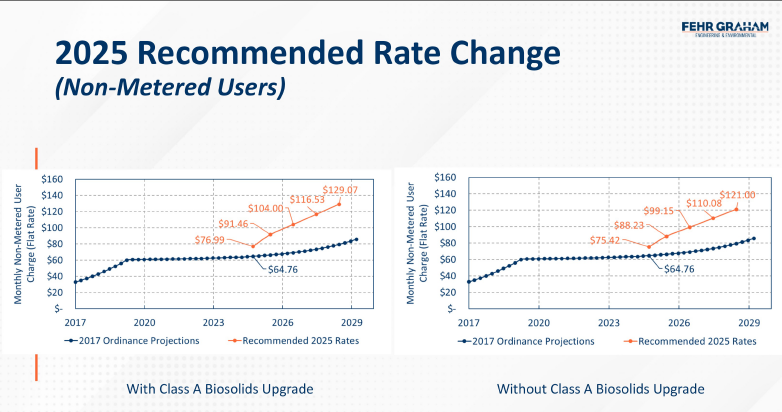South Beloit municipal wastewater rates to nearly double by 2029
4-1 vote leads to rate increases; City officials cite aging lift stations, lost revenue, and state loan requirements in push for higher sewage rates.

"Eight hundred dollars a month": that is how much Michael Lamphear, owner of the Cordial Courts mobile home park in South Beloit, stated his monthly water bill would increase when the new rates for South Beloit municipal sewage service would go into effect.
At this meeting, the council expressed certainty that South Beloit did not service Cordial Courts, which is off Townline Avenue. Mr. Lamphear maintains that though Cordial Courts is outside the city of South Beloit, it is in the police, fire, and municipal water district. The Winnebago County Assessor's website confirms that Mr. Lamphear's property is in unincorporated Rockton Township and his tax bill doesn't show any South Beloit taxes except to the school district.
On Monday, July 21, the South Beloit City Council held a special meeting to highlight two plans that will bring rate increases to those on the city's municipal sewage service. The rates (detailed below) will have to increase for a few reasons:
1) The loss of Axium Foods as a significant sewer district customer, who is exiting the South Beloit wastewater district and treating its wastewater,
2) Maintenance of a lift station costing $7.7 million,
3) A non-mandatory Class A biosolids upgrade costing $3.3 million,
4) Covid has made these projects more expensive according to Jeff Reininger, South Beloit Wastewater district superintendent.
5) Very few rate increases from 1980 to 2014 made it difficult to put funding away "in a rainy day fund," again said Reininger, "so the city wouldn't have to raise those rates now.
6) IEPA rules require municipal water services to collect a minimum amount of revenue to qualify for a low-interest loan to have that work completed.
7) South Beloit's wastewater department currently carries a $600,000 operating deficit. At the meeting, Karoline Qasem, a consultant for Fehr Graham, the firm that conducted the 2025 sewer study, highlighted that the "IEPA generally looks at both revenue and debt when reviewing a system’s financial health. In that context, running a $600K annual deficit isn’t ideal and could raise concerns."
At the meeting, Ms. Qasem did present that being audited could result in the IEPA mandating how much revenue the wastewater district must generate to be included in IEPA's system, "otherwise you cannot operate."
"So, just looking at the bare minimum revenue requirement, you guys must do a rate increase," said Ms. Qasem, while adding the context that these rate increases are not only happening in South Beloit.
Plan A includes items 2-4, while Plan B contains items 2 and 4.
The city plans to build a new, larger lift station on the west side, which brings wastewater across the Rock River from the west side of the town to the sewage treatment plant, and delete two existing lift stations that are more than 30 years old, which is the designed station life. This $7.7 million endeavor, according to Mr. Reininger, will allow the city sewage district to handle increased volume for future development and prevent possibly future costly repair bills.
"The biggest chunk of that is related to this lift station that we've been working on," said Mr. Reininger at Monday's meeting. "But the numbers have been accelerating as to how much it's going to cost us. Quickly, since Covid and since we've all experienced significantly higher prices and things, the sewer department experienced those, too. It's hard to have money when, for the most part, from 1980 to 2014, there were very few, if any, rate increases at all to put some funding away. Sorry for my phrase, "rainy day" fund, so that we wouldn't have to raise those rates now. But we can't go back and fix that. We have to accept that it was done and work towards being frugally responsible and also environmentally responsible. Sometimes that balance for me specifically is very difficult and very frustrating."
Ms. Qasem mentioned that failing to act on these lift station repairs immediately could leave the City of South Beloit dealing with some breakage that would cost more than the suggested lift station upgrades.
Mr. Reininger did refine in a follow-up phone call that there is a rainy day fund, but it is not enough to cover the entirety of this upgrade. This brings the possibility of procuring a low-interest loan from the IEPA. The IEPA stipulates that total revenue would have to increase to qualify for such a loan, and the wastewater district's calculations would bring that new revenue number to $3.98 million.
How much will sewage rates increase?
Rates for metered users and non-metered users are slated to double by 2029, according to the wastewater district's sewer study.
Rates for metered users are charged by every 1,000 gallons of discharged water (which is the same as incoming water) at a current rate of $12.25 per 1,000 gallons. Those with no meter only well service who have city sewage are charged a flat rate of $64.76 a month.
For those with meters, the step-up increases would begin at $14.56 once the new rate structure is adopted and end at $24.42 (recommended plan) or $22.89 just before 2029.

For non-metered users, new rates would initially be $76.99 and end at $129.07 (recommended plan) or $121.

In comparison?
Ms. Qasem highlighted that the city of South Beloit was not the only municipality having this issue.
"You guys must do a rate increase," stated Ms. Qasem. "And this is not only in South Beloit. I saw another one for Woodstock, Elburn. Everybody now has a capital improvement plan for old products. And everybody is doing a rate increase."

For further comparison, Village of Roscoe residents have their waste water treated with Four Rivers Sanitation Authority, headquarted in Rockford. The monthly base fee for sewage, also known as the customer charge, is $2.82 a month. There is a somewhat sliding scale for the amount of water used. Treating 748 gallons would cost the customer about $8.00; 7480 gallons would be $56.84.
At that point, two attendees shared their views on the plan. The first attendee spoke about his rainy day fund.
"You talk about a rainy day fund. My rainy day fund is empty... I don't have money for it."
Mr. Lamphear asked during public comment "what have you done with all the profit over the last "we didn't save any of it?" Couple of decades. And now we need a bunch more from the citizens that we didn't save none of their money. Don't you have like a bunch of land somewhere you could sell by three times as much to just write a check for yourself real quick and leave us out of it?"
Mr. Reininger emphasized in their follow-up calls that 1) the sewer district does not currently have any property, and 2) if the city were to sell property to satisfy this, it would eventually leave taxpayers to cover some other expense at some later point.
The sewage rate increase was put to a vote at the September 2nd, 2025 city council meeting. The rate increase passed by a vote of 4-1, with city council member Brian Hedrington voting no.





